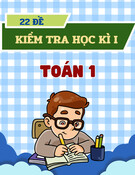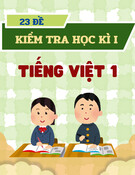
SỞ GD & ĐT QUẢNG NAM ĐỀ KIỂM TRA GIỮA HỌC KÌ I
TRƯỜNG THPT ĐỖ ĐĂNG TUYỂN NĂM HỌC: 2022-2023- Môn: TIẾNG ANH 12 (10 năm)
Thời gian làm bài: 45 phút (Không kể thời gian phát đề)
SECTION I: LANGUAGE USE:
Mark the letter A, B, C, or D on your answer sheet to indicate the word whose underlined part
differs from the other three in pronunciation in the following question.
Question 1.A. like B. wide C. switch D. high
Mark the letter A, B, C, or D on your answer sheet to indicate the word that differs from the other
three in the position of the primary stress in the following question.
Question 2. A. technology B.population C.economic D. education
Mark the letter A, B, C or D to indicate the correct answer to each of the following questions.
Question 3.We should keep the school air clean ………. this will improve students’ concentration and
help them to learn better.
A.and B.because C.but D.if
Question 4.I requested that first-year students ……….. to change their courses in the first two weeks.
A. would be permitted B. be permitted C. were permitted D. are permitted
Question 5. Bamboo is considered to be one of the most…………………building materials.
A. polluted B. chemical C. harmful D. eco-friendly
Question 6.Nguyen Trai ……… King Le Loi to free our country from the invaders in the 15th century.
A.helped B.has helped C.had helped D.was helped
Question 7. The play ……………… the audience’s attention from the very start.
A. took B. grabbed C. created D. switched
Question 8.I love Spain. I find ……….. Spanish very friendly, but I can't say much in Spanish.
A. a B. X C.the D. an
Question 9. Every month he must dispose ………………the oil that his restaurant uses to fry potatoes.
A. for B. with C. on D. of
Question 10. Being a city with ……………..mild climate, Da Lat attracts millions of tourists all over
the country.
A. well-paid B. weather-beaten C. year-round D. fast-growing
Mark the letter A, B, C, or D on your answer sheet to indicate the word CLOSEST in meaning to
the underlined word in the following question.
Question11.The Police said that an anonymouscaller warned that a bomb was about to go off.
A. prosperous B. influential C. well-known D. unnamed
Mark the letter A, B, C or D to indicate the word OPPOSITE in meaning to the underlined word
in the following question.
Question 12.Don’t allow other people to take advantage of your generosity. You should learn to give
wisely.
A. inspiration B. selfishness C. talent D. kindness
Mark the letter A, B, C or D to indicate the underlined part that needs correction in the following
questions.
Question 13.Hard-working and talent students should be given more opportunities to develop their
skills.
A.talent B.to develop C.be given D.skills
Question 14.Mike watched his favourite programme on TV when the lights went out.
A.when B.out C.on D.watched

Mark the letter A, B, C or D to indicate the correct response to each of the following exchanges.
Question15. Lien was walking her dogs in the park, she met Lan accidentally.
Lan: “How lovely your pets are!”
Lien: “……………….”
A. Thank you, it's nice of you to say so. B. Really? They are.
C. Can you say that again? D. I love them, too.
Question16. Maria and Alex are talking about the environment.
Maria: “Our environment is getting more and more polluted. Do you think so?”
Alex: “ ……………. . It’s really worrying.”
A. I’ll think about that B. I don’t agree
C. It’s nonsense. D. I can’t agree more
SECTION II: READING:
A. Read the following passage and mark the letter A, B, C or D on your answer sheet to indicate
the correct word or phrase that best fits each of the numbered blanks from 17 to 21.
Urbanisation can bring about a lot of benefits. It can offer people from rural areas not only
opportunities for (17)…………….jobs, but also access to schools, hospitals and other social services. As
a result, people's overall standard of living can improve. People in rural areas tend to be more
conservative and follow old-fashioned practices like child marriage and gender discrimination. The
process of urbanisation can actually change their mindset and help them to accept more progressive
ideas. (18)……………., there are also some obvious disadvantages. High rates of urbanisation can
contribute to more crime in big cities. Although many people benefit, not all get the opportunity of a
good and stable job. (19)………….people are more likely to engage in robbery, kidnapping, murder and
other illegal activities. Another problem caused by urbanization is the shortage of affordable housing in
big cities, (20)…………….can result in growth of slums with no sanitation or drinking water. In
addition, urbanisation leads to the shift of the working population from agriculture to industries. Labour
shortages in rural areas are likely to result in a decrease (21)………………..agricultural and food
production as well. To sum up, urbanisation can bring social and health benefits; however, it also has its
own drawbacks.
Question 17.A. better-paid B. low-income C. high-cost D. time-consuming
Question 18.A. Moreover B. As a result C. However D. In addition
Question 19.A. Employed B. Unemployed C. Unemployment D. Employment
Question 20.A. what B. that C. who D. which
Question 21.A. in B. on C. for D. with
B. Read the following passage and mark the letter A, B, C, or D on your answer sheet to indicate
the correct answer to each of the questions from 22 to 26.
Plastic is a material we use every day. The first plastics were made more than 100 years ago
from parts of plants. Plastics are now made from oil, coal and natural gas. We are using up these things
so fast that the Earth’s supplies may run out. Because of this, scientists are investigating new ideas for
making plastics from plants such as sweet potato, bamboo and flax.
Things made from plastic can be useful for people but bad for the planet. Some plastics can last for a
long time without wearing out, and can be difficult to get rid of when they are not needed. They can
remain in rubbish dumps called landfill sites for hundreds of years. Landfills can be smelly, ugly, and
harmful to our planet.
Recycling is a good way to get rid of unwanted plastics. Recycled waste materials can be used again
to make new products. This can be difficult as different types of plastic need to be recycled in different
ways. Some kinds of plastics can be melted down and used to make new things such as bags and bottles.
Others can be made into fibres (strands of material) for clothing.

Another way to protect the environment is to use canvas bags for shopping rather than plastic ones. A
lot of plastic objects can also be reused. Plastic bottles can be refilled many times, rather than throwing
them away once they are empty. Unwanted plastic goods such as CDs and toys can be sold or given
away to charity shops.
(Adapted from: https://www.esolcourses.com)
Question 22. What is the passage mainly about?
A. The history of plastic and its usefulness
B. Materials that plastic is made of
C. Plastic: effects and solutions to the problem
D. The ways to reduce the harm of plastics on the environment
Question 23. The phrase “get rid of” in paragraph 2 is closest in meaning to …………..
A. create B. eliminate C. make D. keep
Question 24. According to the passage, things made from plastic are bad for our environment because
…………..
A. they are a danger to marine life such as whales, turtles and so on.
B. they are very convenient for people to use in different purposes.
C. people reuse plastic objects before recycling them.
D. plastics can exist for a long time without decomposing.
Question 25. According to the passage, which of the following is TRUE?
A. Plastic objects are useful for people without negative impacts.
B. Plastics and plastic objects can be thrown away to tidy the room.
C. Plastics and plastic objects can be recycled or reused.
D. Some kinds of plastics can be melted down, then released into the river.
Question 26. The word “They” in paragraph 2 refers to ……………..
A. Plastics B. Things C. Rubbish dumps D. People
SECTION III: WRITING:
Mark the letter A, B, C, or D to indicate the sentence that best combines each pair of sentences in
the following questions.
Question 27.A car hit the fence of my garden. I was cleaning the swimming pool.
A. While a car hit the fence I was cleaning the swimming pool.
B. A car hit the fence and I was cleaning the swimming pool.
C. I was cleaning the swimming pool when a car hit the fence.
D. I was cleaning the swimming pool then a car hit the fence.
Question 28.The rapid urbanization led to many serious problems. One of those is the growth of slums.
A. The rapid urbanization is the cause of many serious problems such as the growth of slums.
B. The rapid urbanization is consequent of many serious problems like the growth of slums.
C. The rapid urbanization is created by many serious problems such as the growth of slums.
D. The rapid urbanization is resulted by many serious problems like the growth of slums.
Question 29.Everybody should make an effort to go green. This can help to save our planet for future
generations.
A. Everybody should make an effort to go green, which can help to save our planet for future
generations.
B. Everybody should make an effort to go green, that can help to save our planet for future generations.
C. Everybody which can help to save our planet for future generations should make an effort to go green.
D. Everybody should make an effort to go green, who can help to save our planet for future generations.

Mark the letter A, B, C or D to indicate the sentence that is closest in meaning to each of the
following questions.
Question 30.The chairman requested the members to study the problem carefully.
A. The chairman requested that the members study the problem carefully.
B. The chairman requested the problem could be studied with more carefulness.
C. The member requested that the problem was carefully studied by the chairman.
D. It was requested that the members studied the problem more carefully.
Question 31. Government should use national resources in a more efficient way in order to meet the
needs of growing populations.
A. It is essential for national resources use in a more efficient way in order to meet the needs of growing
populations.
B. It is too essential for government to use national resources in a more efficient way in order to meet
the needs of growing populations.
C. It is essential that national resources be used in a more efficient way in order to meet the needs of
growing populations.
D. It is essential that national resources use in a more efficient way in order to meet the needs of
growing populations.
Question 32. He last went out with his friends a month ago.
A. He didn’t go out with his friends a month ago.
B. He has gone out with his friends for a month.
C. He has a month to go out with his friends.
D. He hasn’t gone out with his friends for a month.
SECTION IV: LISTENING:
Listen to the recording twice then choose A, B, or C to best answer the questions.
Question 33. Tanni Grey-Thompson is the winner of ………….World Championship titles.
A. 13 B. 31 C. 30
Question 34. Grey-Thompson …………..
A. is still taking part in athletics competitions.
B. has finished her sporting career.
C. died many years ago.
Question 35. Thomas Edison was a(n) …………..scientist.
A. American B. French C. British
Question 36. Thomas Edison was born in …………..
A. 1817 B. 1874 C. 1847
Question 37. Thomas Edison invented a machine which could………
A. take photos B. record music C. draw pictures
Question 38. Nelson Mandela was the President of South Africa for ……………..years.
A. three B. four C. five
Question 39. Mandela spent a long time in ………….
A. hospital B. prison C. school
Question 40. Mandela won the Nobel Prize for ……………in 1993.
A. Peace B. Literature C. Physics
THE END






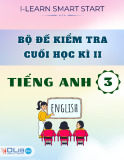
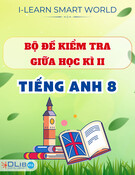
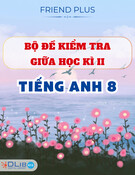
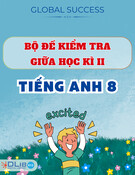
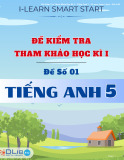

![Đề thi Tiếng Anh có đáp án [kèm lời giải chi tiết]](https://cdn.tailieu.vn/images/document/thumbnail/2025/20250810/duykpmg/135x160/64731754886819.jpg)
